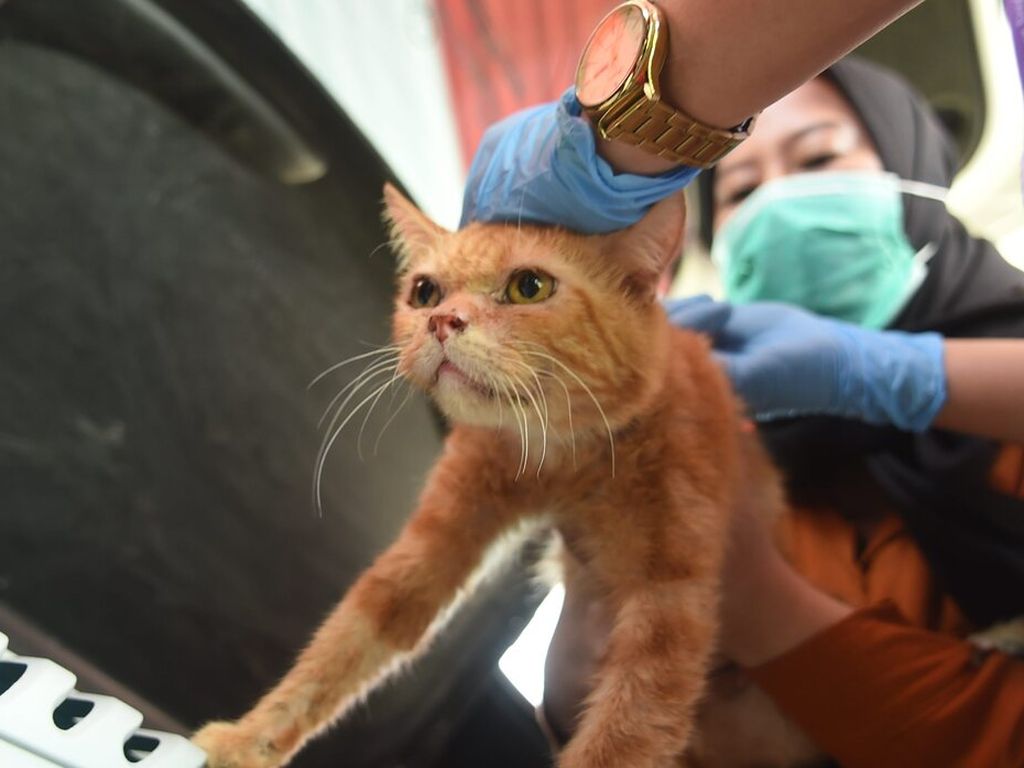KOMPAS/RIZA FATHONI
Medical officers from the Animal Health Center (Puskeswan) of the South Jakarta Administration for Resilience, Agriculture and Fisheries inject an anti-rabies vaccine at the RPTRA Taman Mandala, Tebet, South Jakarta, Saturday (31/10/2020). The free vaccine is given to prevent and anticipate the spread of rabies to pets.
JAKARTA, KOMPAS – The rate of anti-rabies vaccination has decreased during the Covid-19 pandemic. In fact, if 70 percent of dogs or animals that transmit rabies in an area are successfully vaccinated, the spread of the disease can be prevented. Vaccination must be boosted so that Indonesia is free of rabies by 2030.
Data from the Ministry of Health shows that cases of animal bites that transmit rabies have decreased in recent years. The number of bite cases in 2019 reached 100,826 cases, then decreased to 82,634 cases in 2020. As of October 2021, there were 42,450 cases of bites from rabies-transmitting animals.
The coverage of anti-rabies vaccination also decreased, namely 67,625 vaccinations (2019), 56,797 vaccinations (2020), and 30,776 vaccinations (October 2021). The number of deaths from rabies was 105 cases (2019), 40 cases (2020), and 40 cases (October 2021).
Meanwhile, the Ministry of Health noted that there were 100-156 deaths per year due to rabies. In 2017 to October 2021, there were 381,281 cases of bites and 407 deaths from rabies.
“We hope that the Indonesian government will seriously respond to the rabies situation,” said Professor of Virology and Immunology, Faculty of Veterinary Medicine, Airlangga University, Suwarno at an online discussion held by the Indonesian Veterinary Association (PDHI), Saturday (20/11/2021). “If not treated seriously, death in humans will run all the time,” he added.
Also read: Student Death in Ende Due to Dog Bites Rabies Threatens Flores Tourism
Vaccination
Rabies is a zoonotic disease—a disease that is transmitted from animals to humans—that can be treated by vaccination. To achieve community immunity, vaccination coverage to animals in an area must reach 70 percent. However, said Suwarno, the average vaccination coverage in Indonesia is still around 40 percent.
One of the obstacles to vaccination is that dogs are difficult to catch. Dogs are targeted for vaccination because 98 percent of cases in Indonesia are transmitted by dogs, while the other two percent by monkeys and cats.
Kompas / Priyombodo
Officers give rabies vaccine to residents’ pet dogs in RW 06, Pesanggrahan Village, South Jakarta, Tuesday (11/24/2020). This free rabies vaccination activity which is open to the public is carried out to make Jakarta a rabies-free area. Enthusiasm of residents is high enough to come to the place of implementation of the vaccine in the midst of the Covid-19 pandemic while still paying attention to health protocols. Kompas/Priyombodo (PRI) 11-24-2020
Another obstacle is the dynamic dog population, the high interprovincial or interstate animal traffic, and the consumption of dog meat. In addition, vaccination is constrained by the absence of definitive data on the population of dogs and animals that transmit rabies.
The presence of released dogs also makes vaccination difficult. This condition also hampers animal traffic control and population control.
Vaccination plays an important role in the prevention, control and prevention of rabies. Rabies vaccination in animals can stop the spread of the rabies virus. Meanwhile, vaccination in humans can save lives from viral infections.
“Vaccination plays an important role in the prevention, control and prevention of rabies. Rabies vaccination in animals can stop the spread of the rabies virus. Meanwhile, vaccination in humans can save lives from viral infections,” said Suwarno.
Also read: Indonesia is Optimistic to be Free of Rabies in 2030 with Domestic Vaccines
Chairman of PDHI Muhammad Munawaroh said the government had not taken rabies seriously. In fact, Indonesia is targeting to be free of rabies by 2030. Reflecting on the handling of the Covid-19 pandemic, he encourages rabies vaccination to also be boosted.
“Rabies needs to be taken seriously. If not, this will just be a slogan, “he said.
Compass/Bahana Patria Gupta
Minister of Agriculture Syahrul Yasin Limpo (left) hands over a vaccine card during a free rabies vaccination on the commemoration of Rabies Day 2021 at the Veterinary Farma Center (Pusvetma) East Java, Surabaya, Friday (10/8/2021). On the same occasion, Minister of Agriculture Syahrul launched two vaccines and one serum from Pusvetma research results. Starting from vaccines for rabies, bird flu vaccines to swine flu serum. The activity also carried out free rabies vaccination for 400 animals.
Prevention
The secretary of the Flores Lembata Rabies Committee, Asep Purnama, is concerned that the decline in vaccination rates will lead to a spike in rabies cases in the future. In addition to vaccinating animals, people who are at high risk of being infected with rabies need to be vaccinated immediately.
High risk people such as veterinarians, rabies virus researchers, work related to animals, to people who want to travel to rabies endemic areas. Professor of the Faculty of Medicine, University of Indonesia, Samsuridjal Dzauji, reminded that vaccinations must be carried out carefully.
Compass/Totok Wijayanto
Residents with their pet cats queue to get the rabies vaccine given by the KPKP Sub-dept. and West Jakarta Animal and Livestock Health Service Center at RW 03, South Sukabumi, Kebon Jeruk, West Jakarta, Wednesday (8/9/2021). The vaccination, which had been stopped due to the emergency PPKM, has started to be held again at the same time to welcome the 2021 world rabies day.
Also read: Endemic Rabies in the Midst of the Covid-19 Pandemic
Until now, there are only eight provinces in Indonesia that are free of rabies. They are the Riau Islands, Bangka Belitung Islands, DKI Jakarta, Central Java, DI Yogyakarta, East Java, Papua, and West Papua.
According to the Director of Prevention and Control of Vector and Zoonotic Diseases of the Ministry of Health, Didik Budijanto, the government has developed an e-Zoonosis, which is a system for monitoring and evaluating zoonotic diseases. There are seven diseases recorded by this system, one of which is rabies.
–


